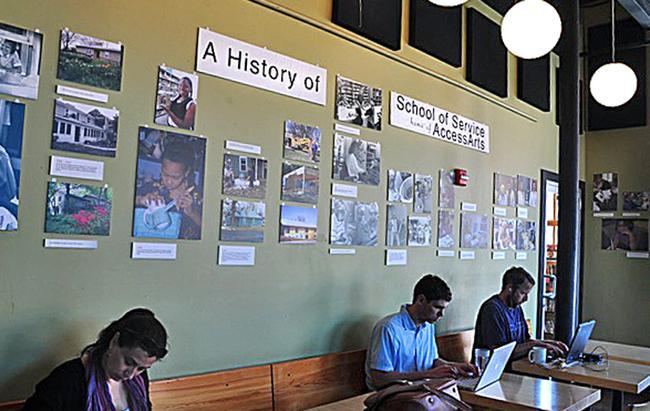To celebrate 40 years of making art more available to people from all walks of life, Access Arts is hosting a series of community events.
An art and photo exhibit will be on display at Ragtag Cinema until Saturday, when Access Arts will host an open house on its campus for the dedication of two buildings.
Access Arts began with one man inspired by his son, who had cerebral palsy.
Hurst John wanted his son Larry to have the chance to make art, as well as for the community to break down preconceived notions.
“He wanted to create an organization that focused on giving people with disabilities opportunities in the arts while reaching a wider audience, incorporating people who wanted to break down the misconceptions,” says Access Arts Executive Director Chris Sharp.
John was an architect and wanted to build a school for the program, but a fatal stroke prevented him from seeing his full vision realized. Naoma Powell, a friend of the John family and a Columbia native, took over the mission. She tried a few different ways of managing the program before finding one that worked.
The first of the campus’ three buildings began as a live-in building in addition to an art center.
“She realized there was a limited ability as far as the audience she could reach,” Sharp says. “So then she started the education program, which was Access Arts.”
This program was meant to focus on making art accessible to everyone with disabilities, different ages and backgrounds.
Not only are all three campus buildings Americans with Disabilities Act accessible, but the program has adaptive equipment that can be modified to fit different needs of different artists.
People have come from around the nation to get involved with the program.
“As far as workshops go, we’ve had people from as far as Tennessee drive in,” Sharp says. “We’ve brought in artists from Arizona and Oregon. We’ve even sent our own artists as far away as Union, Mo.”
Some of their students have gone even further than that. Among the success stories, one student went from being completely new to pottery to selling his own internationally.
“One gentleman came in here and stated taking pottery classes after he retired to Columbia,” Sharp says. “He progressed to the point where he’s an aspiring professional potter. He was convinced he had two left thumbs and he ended up making beautiful pottery.”
He has recently moved to Israel to sell his work.
Many other students have been affected by Access Arts, including Marsha Ely, whose first class was taught by Powell about 13 years ago through the Columbia Art League. She says eventually, Access Arts became like a second family.
“She never had kids of her own, but she always called us her kids,” she says about Powell.
Ely says almost everyone with any connection to the program ends up volunteering.
“I work at Art in the Park, help with cleaning the studio, some of the different festivals, just whatever they need,” she says.
Sharp says volunteering is a huge part of the group’s operation, with only two full time staff members.
Access Arts has had to overcome some setbacks, including Powell’s retirement and recent economic downturn reducing funding, but some good might come from it.
Where funding drops for schools, Access Arts could fill in holes.
“It validates our need to be here in the community,” Sharp says.
Loyal members of the community will continue to return. Ely says the best part of Access Arts is the people she gets to know.
“Meeting some really good people, plus doing something we really enjoy,” she says. “Throwing pottery is just so fun.”
The activities this week are to celebrate all the hard work the community puts in and the impact Access Arts has had.








